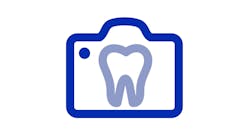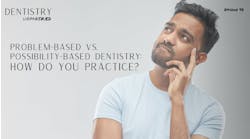Please tell me what the "Super Norm Model" is that was mentioned twice in an article by Jeffrey R. Lavers in your November 2002 issue. I'll be grateful for an explanation.
Dr. Frank Jennings
San Antonio, Tex.
Response from Jeffrey R. Lavers
Thanks for your question, Dr. Jennings. The "Super Norm Model" is one of five practice models identified within the American Dental Trade Association (ADTA) 2000 Market Trends Report. This report examines how economics, demand, and supply will shape the dental industry's future. According to the report, a practice model is a kind of "business definition" that represents the business and clinical orientation of the dental practice. Additional models include "Ready Access," "Tech Station," "Small Group," and "Cosmetic Center." The "Super Norm Model" is defined as follows: "Emphasis on high-touch, service-intensive patient experience; customer intimacy and high-margin work with demanding patients." These models were detailed in the first of our three-article series titled "Market Trends in Dentistry," which appeared in the October 2002 issue of Dental Economics.
You will note that the dentists profiled within the article you referenced (the second in the series) tend to utilize facets of various models, combining elements based on patient need, as well as overall comfort level and practice philosophy. For example, one dentist incorporated the service intensity of the "Super Norm Model" while utilizing the latest technology. As with everything else, one size does not fit all, and it is important to remember that new models continue to evolve.
Thank you for your inquiry. Please feel free to contact me at [email protected] with any additional questions.
Jeffrey R. Lavers
Marketing Director
3M ESPE
Choose your architect carefully
During the past year, while building my dream office with a partner, I have looked forward to the "Office of the Month" issues. You have gracefully shown that building a dream office requires vision, as well as technology. I would also like to add the importance of choosing an architect. So far, this has been the most economical choice we have made. Throughout this exhausting experience, I have found the architect to be the only person working as your advocate. Reps generally offer a vision based on what they sell, while the architect is most concerned with aesthetics, function, and ergonomics. An architect can see further than the next dental gadget, and is fantastic when dealing with the contractor, as well as your local building department. My architect was able to use lighting and architectural features to maximize our small space, allowing us to lease 500 sq. ft. less! We never spent one dime on a decorator, and put our money into architectural details that are technology-ready. I credit the architect for not only improving our vision, but making it completely tangible. The credit goes to Scott Benjamin of Bahr Architects. He so patiently designed the office with and for us.
Jennifer Creelman, DDS
San Francisco, Calif.
Don't cut financial services profession
While Dr. Hugh Doherty's article on variable annuities made some technically sound points, it certainly would be refreshing to read an article where the author did not feel like he or she needed to cut down the financial services profession in order to elevate themselves.
In his article, Dr. Doherty says, "VAs are sold to people who don't want the death benefit, don't want to annuitize, and don't understand it is an illiquid benefit.
"VAs pay good commissions to salespeople. Ask what their commission is, and then you will understand why they don't push term insurance. A study by Charles Schwab reveals that many people who have VAs don't need them. With a VA, brokers find solutions to an 'astonishing' number of clients' problems."
All of the above are rash generalizations, not to mention completely unprofessional. As you mentioned, VAs are complex financial products. Instead of using your space for self-promotion, why didn't you spend more time on the complexities? On a side note, does Charles Schwab have anything to gain from discrediting brokers? Interesting.
Also, your reference to a court case where a bank was sued for not properly disclosing a VA is also irresponsible on your part. First of all, I draw a huge line of distinction between branch managers with a Series 6 pushing VAs because the bank pressures them to do so, and a professional broker or advisor.
Secondly, do dentists ever get sued? Are there any dentists in the United States who practice unethically and have to pay for it? The answer is yes, but we don't write entire articles about those people. We save that copy space for self-promoting financial planners who evidently don't have enough good credentials to promote themselves.
Shame on Dental Economics for not exercising some editorial control. Articles written for DE should be generic in nature and educational, not paid advertisements that use blanket statements to defame an entire profession. As a highly regulated securities representative, I am unable to make such generalizations and unfounded statements in articles that I author. It's too bad those rules don't apply to everyone!
Andy Upchurch, RHU, REBC
Reply from Dr. Hugh Doherty
I offer the following response to your letter of January 13 about my article, "Beware Variable Annuities." First of all, I feel that it would be imperative that you understand some important facts about Dental Economics and myself. Your disparaging, misinformed remark, "Shame on Dental Economics for not exercising some editorial control" was probably made in anger. Dental Economics is the number one — and most respected — magazine for the dental profession in the United States. The magazine is totally dedicated to bringing to the dentists articles containing nothing but the best information on management and finance.
Your remark, "... copy space for self-promoting financial planners who evidently don't have enough good credentials to promote themselves," that was intended for me needs serious clarification. To know me personally, you would discover that I tell it like it is. I am a retired dentist who is dedicated to giving back to the greatest profession in the world, dentistry. In addition to my dental education, I obtained a Certified Financial Planner designation from the College of Financial Planning, and attended Harvard Business School. I have a registered representative Series #7 license, which I'm sure you know enables the holder to sell any type of securities. I also have life and health insurance licenses, so I could sell these types of insurance. But I don't. I am a fee-only planner. I sell no products. So, when I make recommendations or provide strategies, they are unbiased. I offer nothing but good, solid advice for the doctor and his or her family on how to reach future financial security. I trained long and hard to obtain those licenses. You may ask why? I did it only to learn more about the biased suggestions that are forthcoming from many financial professionals to dentists, who unfortunately don't have a complete understanding of what has been proposed. My total objective is to educate doctors on these biases, and to make sure that their hard-earned money is "mailed" to the right place.
I urge my doctor-clients not to buy annuities. I do recommend to my doctor-clients that they fall in love with "tax-deferred" investing. The first tax-deferred recommendation is that each and every doctor and their spouse have an IRA. The second one is that through their practice, they should establish a qualified retirement plan. I know that the next investment that could be suggested would be a tax deferred annuity. But I bypass this type of investment and suggest that my doctor-clients develop a personal portfolio (post tax dollars).
There are many reasons for this bypass. Most doctors start their careers later in life than most people. A lot of ground has been lost by doctors in the savings and investment areas. Annuities are unable to help them to overcome their lost opportunity of saving and investing. Dentists also are faced with a mountain of debt — i.e., student loans, marriage, purchasing a practice, buying a home, raising children, education funding, and finally retirement funding. Annuities can't help this picture. Simply stated, annuities are not for high income-producing doctors. Annuities are for little old ladies looking for some type of financial security.
Hugh F. Doherty, DDS, CFP
Spring Lake Heights, N.J.
Between rock and a hard place with VUL
My name is Jeff Harrison, and I am a dentist in Colorado Springs, Colo. I read your article titled "Beware Variable Annuities," and I wondered if you could give me some advice.
Two years ago, I took out a variable universal-life (VUL) policy. It was sold as the vehicle for tax-free retirement savings when withdrawals are made, a good way to fund college for my daughter, or just a good place to invest money. I have a young, start-from-scratch practice that will have high debt service for another two years.The policy was appealing to me because it made me begin to put money away for retirement at a young age. I am now 32. I knew the policy had a death benefit to protect my wife and daughter should I die. The benefit is just over one million dollars and would pay off our mortgage, car, and practice debts with some money left over to invest. To minimize estate taxes, the policy is now tied to an Irrevocable Life Insurance Trust set up by my estate-planning attorney.
However, with the last two years of poor stock performance and the high fees associated with the VUL, my $19,000 is currently worth $8,323.If I quit this program now, all is lost because it takes 10 years to show a cash-surrender value. If I invest only the cost of term insurance, my broker tells me the policy will last another 24 years with 20 years of minimal investment ($1,250 per year).
I had a $250,000 term policy before taking out my $1,000,000 VUL, but I stopped paying the premium on the term policy when I took out the VUL. I sure wish I had read this article two years ago! What should I do now?
Jeff Harrison, DDS
Colorado Springs, Colo.
A representative of the majority speaks
Dr. Charles Barotz has touched the nerves of about .0000001 percent of the dentists in America in the article, "The Chain of Value," in the November 2002 issue of Dental Economics. Those dentists have been published over and over, while decrying the "inflammatory" fee schedule of poor ol' Charlie, once again repeating the old bromide, "If you charge less than I do, you are doing shoddy work, and if you charge more than I, well, you are cheating your patients."
On behalf of the 99.9999999 percent who support Charlie, I take my hat off to a guy who has the secret envy of the minority. These bellyaching dentists drive expensive cars costing far more than a Hyundai and fully
understand that paying that extra cost is their option. Nobody is forcing them to buy fancy German cars. I don't get it!
Charlie, you're beautiful, and I wish you had been around writing about your practice when I was a young buck getting started.
Michael L. Janket, DMD
Putnam, Conn.
'Giving back to dentistry' column
First of all, Dr. Blaes, I would like to commend you on your work on Dental Economics. I am sure that you will help make a great magazine even better. I remember when DE went into the "ho-hum" stack; now it goes into the "must-read" stack every month. I have seen DE evolve over the years, and everyone involved can be proud of your collective efforts.
I am also impressed with the decision to write the monthly "Giving back to dentistry" column. I am sure that you will find that the number of dentists participating in a whole spectrum of charity programs is both staggering and gratifying. My involvement goes back only a dozen years. We take care of the dental needs of two orphanages in Mexico, and also provide free dental care to children here in the U.S. in both Los Angeles and Orange counties.
During this time, I have met many dedicated dentists and many more lay people who have quietly been providing literally millions of dollars of dental care to people who desperately need the help. Some of these doctors have been doing this for over 30 years.
This tradition of "giving back" is not only alive and well in dentistry, but it is something that we can all be proud of.
Again, thanks for a great publication and thanks also for highlighting a facet of our profession that often goes unnoticed, yet impacts so many.
Charles P. Tozzer, DDS
Irvine, Calif.





